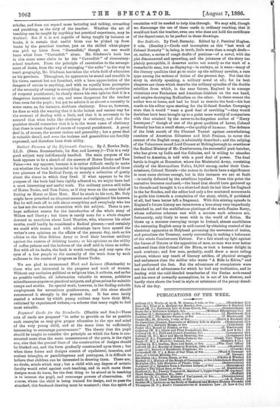Our Radicals. By Fred. Burnaby. Edited by J. Percival Hughes.
2 vols. (Bentley.)—Crude and incomplete as this "last work of Colonel Burnaby" is, being, in troth, little more than a rough draft— or, rather, a series of rough drafts of portions—of a novel, with the plot disconnected and sprawling, and the jointures of the story too plainly perceptible, it deserves notice not merely as the work of a remarkable man, but as displaying—in embryo, as it were—mana; of the literary qualities that go to make up the military novelist, a rare type among the writers of fiction of the present day. Not that the story is, strictly speaking, a military novel at all ; for its best chapters are those which describe the military episodes of the doable rebellion from which, in the near future, England is to emerge victorious over Fenianism and American-Irishism on the one hand, and empire-destroying Radicalism on the other. In these scenes the author was at home, and had he lived to rewrite the book—his last words to his editor upon starting for the ill-fated Soudan Campaign were that it would "want a good deal of rewriting "—they would doubtless have been brought up to a point more worthy of comparison with that attained by the never-to-be-forgotten author of "Harry Lorrequer ;" though of one of the great qualities of Lever, Colonel Burnaby has but a small sharo,—the quality of humour. The defence of the Irish month of the Channel Tannel against overwhelming numbers of American filibusters and Irish Fenians, to cover the retreat of the English army, is admirably described ; and the rallying of the Volunteers round Lord Cromer at Meltingboroagh to overthrow the Radical Ministry of Mr. Cambermore, the successful pork-butcher, who has given up India and the Colonies, and is willing to abandon Ireland to America, is told with a good deal of power. The final battle is fought at Hounslow, where the Ministerial Army, consisting chiefly of the Metropolitan Police, 18,000 strong, under their Com- missioner, Colonel Metrale —the names in the book have a significance in most cases obvious enough, but in this instance we are at fault —is totally defeated by the rebellions loyalists. From this point the narrative becomes confased,—the hand that should have gathered up its threads and brought it to a close had dealt its last blow for England in the far Soudan, and the editor had only a few scattered memoranda to guide him towards a completion of the story, which, if published at all, had been better left a fragment. With this stirring episode in England's future history are interwoven a love-story very imperfectly sketched in, and the multifarious plottinga of the arch-Fenian Barry,, whose nefarious schemes met with a success each schemes are, fortunately, only likely to meet with in the world of fiction. He blows up a steamer conveying troops to Ireland, almost annihilates the retreating English army in mid-tunnel by obtaining control of the electrical apparatus at Holyhead governing the movement of trains, and petrolises the Treasury, nearly succeeding in making a holocaust of the whole Cambermore Cabinet. For a fair stand.up fight against the forces of Nature or the opposition of man, no man was ever better- endowed than this Colonel of the Blues, or took a keener delight in each combats ; and few men, probably, could draw a more telling picture, without any touch of literary artifice, of physical straggle and endurance than the soldier who wrote "A Ride to Khiva," and had performed the feat. But the adventures of conspirators were not the kind of adventures for which he had any inolinatioa, and in dealing with the cold-blooded treacheries of the Fenian arch-rascal and his crew of cowardly accomplices, he is out of his element, and hardly rises above the level in style or substance of the penny-dread- fuls of the day.


































 Previous page
Previous page